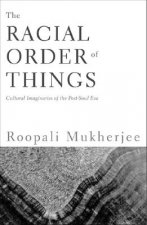
Kód: 04725334
Latin American Thought
Autor Susana Nuccetelli
Many of the philosophical questions raised in Latin America may seem to be among the perennial problems that have concerned philosophers at different times and in different places throughout the Western tradition, but they are not ... celý popis
- Jazyk:
 Angličtina
Angličtina - Väzba: Brožovaná
- Počet strán: 292
Nakladateľ: Taylor & Francis Inc, 2001
- Viac informácií o knihe

Mohlo by sa vám tiež páčiť
-

Implementing Lean Six Sigma throughout the Supply Chain
84.19 € -

Faults and Subsurface Fluid Flow in the Shallow Cr ust, Geophysical Monograph 113
68.31 € -

Art of War for Writers
20.17 € -

High School of the Future
144 € -

Koren Talmud Bavli
56.74 € -

Frank Stewart's Bridge Club
20.68 € -

Home, Uprooted
39.94 € -

Guide to Liverworts of North Carolina
86.34 € -

Fuel and Guts
46.80 € -

Discovering Mahler
124.85 € -

Futures Past
43.32 € -

Multivalence of Biblical Texts and Theological Meanings
31.84 € -

Applied Human Resource Management
229.33 € -

Our World 5: Workbook
19.14 € -

What I Saw and How I Lied
12.28 € -

Pursuit of Virtue
53.15 € -

Racial Order Of Things
38.20 € -

Missional Church in Context
31.44 € -3 % -

Archibald Cox
28.77 € -

Capital Controls
14.64 € -

All the Days and Nights
15.05 € -13 %
Darčekový poukaz: Radosť zaručená
- Darujte poukaz v ľubovoľnej hodnote, a my sa postaráme o zvyšok.
- Poukaz sa vzťahuje na všetky produkty v našej ponuke.
- Elektronický poukaz si vytlačíte z e-mailu a môžete ho ihneď darovať.
- Platnosť poukazu je 12 mesiacov od dátumu vystavenia.
Viac informácií o knihe Latin American Thought
Nákupom získate 208 bodov
 Anotácia knihy
Anotácia knihy
Many of the philosophical questions raised in Latin America may seem to be among the perennial problems that have concerned philosophers at different times and in different places throughout the Western tradition, but they are not altogether the same--for Latin American thinkers have often adapted them to capture problems presented by new circumstances, and sought resolutions with arguments that are indeed novel. This book explains how well-established philosophical traditions gave rise in the New World to a characteristic form of thought not to be found in other cultures. There was no clean sweep of the past and an attempt to start over: rather, Latin American thinkers gradually adapted European ideas to their needs, sometimes borrowing on a larger scale, sometimes less. It is then no surprise that, under Iberian rule, Scholasticism became the accepted view and began to lose its grip only when the rulers did. But what does seem surprising is the radical way in which those traditions were on occasions challenged, as illustrated by the cases of Jose de Acosta, a Jesuit priest in Peru, and the Mexican nun, Juana Ines de la Cruz--each of whom spoke out against certain aspects of the official philosophy in colonial society. And when theories familiar elsewhere arrived to Latin America, as in the cases of positivism and Marxism, they were often seen differently in the light of new circumstances.But above all, this book shows that there is a body of interesting philosophical arguments offered by Latin Americans concerning problems that have arisen in Spanish- and Portuguese-speaking parts of the New World. In connection with this purpose, it examines how Latin Americans have thought about philosophical issues belonging to metaphysics, philosophy of science, cross-cultural psychology, feminist epistemology, ethics, and social and political philosophy. These are taken up in due course, paying special attention to questions of rationality, gender discrimination, justice, human rights, reparation for historically dispossessed native peoples, and relativism vs. universalism--all matters of continuing concern in Latin American thought, from its earliest stirrings to the present day. And among some specific issues that have generated heated controversies from the early twentieth century to the present, the book explores how Latin Americans and their descendants abroad think of their own cultural identity, examines their critique of US mass-culture and moral philosophy, and considers at some length the vexing problem of which name, if any, is the correct one to use to refer to all of this exceedingly diverse ethnic group. A closer look at the defining elements of Latin American identity has often led to questions concerning the characteristic features that might distinguish Latin Americans and their descendants abroad from other peoples of the world, the existence of a typically Latin American philosophy, and the correct name to refer to them. These, often conflated in the literature, are treated separately by the author, who favors a historically-based account of Latin-American identity. She also argues that the existence of a characteristically Latin American philosophy can be shown--though not by appealing to some standard but implausible reasons. And to resolve the question concerning a correct ethnic-group name, she proposes a new approach to the semantics of those names.
 Parametre knihy
Parametre knihy
Zaradenie knihy Books in English Humanities History Regional & national history
84.39 €
- Celý názov: Latin American Thought
- Podnázov: Philosophical Problems And Arguments
- Autor: Susana Nuccetelli
- Jazyk:
 Angličtina
Angličtina - Väzba: Brožovaná
- Počet strán: 292
- EAN: 9780813365534
- ISBN: 0813365538
- ID: 04725334
- Nakladateľ: Taylor & Francis Inc
- Hmotnosť: 442 g
- Rozmery: 229 × 152 × 22 mm
- Dátum vydania: 31. December 2001
Obľúbené z iného súdka
-

Hundred Years' War on Palestine
12.08 € -24 % -

Ten Myths About Israel
12.59 € -16 % -

Strange Death of Europe
16.58 € -16 % -

The Balkans, 1804-2012
22.01 € -23 % -

Empress of the East
14.43 € -23 % -

Rise And Fall Of The Third Reich
22.01 € -23 % -

Maurice's Strategikon
30.62 € -2 % -

Last Voyage of the Lusitania
20.68 € -

Voynich Manuscript
41.27 € -

Moshe Dayan
27.34 € -9 % -

The Fourth Turning
20.68 € -1 % -

General's Son
20.27 € -4 % -

History of Venice
18.73 € -23 % -

Short History of Byzantium
18.73 € -23 % -

Yitzhak Rabin
16.58 € -10 % -

Hell's Cartel
21.19 € -13 % -

Interpreting Our Heritage
30.21 € -

Paradise Lost
13.20 € -24 % -

American Nations
16.69 € -14 % -

Games without Rules
19.25 € -6 % -

Lynching in the New South
34.30 € -

City of Fortune
14.43 € -23 % -

Habsburg Monarchy 1809-1918
16.58 € -23 % -

Ethnic Cleansing of Palestine
14.43 € -23 % -

Decline and Fall of the Roman Empire
5.93 € -21 % -

Palestine
20.27 € -21 % -

The Secret Diaries Of Miss Anne Lister: Vol. 1
13.61 € -14 % -

Giza Power Plant
16.07 € -16 % -

Age Of Revolution
16.58 € -23 % -

Citizens
22.01 € -23 % -

Millennium
13.20 € -24 % -

Alexiad
17.81 € -20 % -

Heraclius, Emperor of Byzantium
33.38 € -18 % -

1948
24.68 € -10 % -

Annals of Imperial Rome
14.43 € -23 % -

Strike and Hold
30 € -3 % -

Diana: Her True Story - In Her Own Words
11.26 € -25 % -

How to be a Victorian
14.43 € -23 % -

The Oxford History of Ancient Egypt
15.46 € -23 % -

Londoners
11.26 € -25 % -

History of Japan
16.48 € -18 % -

Illustrated Encyclopedia of Uniforms of the American War of Independence
22.01 € -23 % -

Olympic, Titanic, Britannic
30.31 € -15 % -

Medieval Monsters
11.15 € -23 % -

Secret History
12.28 € -23 % -

The Thirteenth Tribe
12.69 € -

Footnotes in Gaza
27.34 € -13 % -

Biggest Prison on Earth
14.43 € -23 % -

Great Gatsby (Wisehouse Classics Edition)
16.17 € -37 %
Collection points Bratislava a 2642 dalších
Copyright ©2008-24 najlacnejsie-knihy.sk All rights reservedPrivacyCookies



 15549 collection points
15549 collection points Delivery 2.99 €
Delivery 2.99 € 02/210 210 99 (8-15.30h)
02/210 210 99 (8-15.30h)